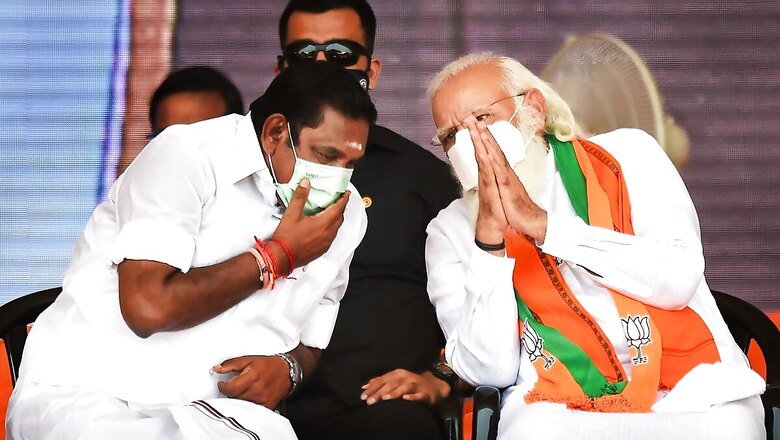
views
In Tamil Nadu, there is one emotive issue that has been a part of the electoral politics for decades now. It is the Sri Lankan Tamils. And, 2021 is no exception. It also explains why the demand for the release of seven prisoners convicted in the 1991 Rajiv Gandhi assassination case has acquired political colours. The AIADMK and its ally, the BJP, are not on the same page here. The role of Tamil Nadu Governor Banwarilal Purohit in not accepting the state cabinet decision to release the convicts but referring the matter to the President of India has attracted criticism from various opposition parties, leaving the AIADMK on a sticky wicket.
The issue had assumed gargantuan proportions when then chief minister J. Jayalalithaa had announced on February 18, 2014 that the convicts in the case would be released as they have spent more than 20 years in prison. The Manmohan Singh government at the Centre was stunned but recovered quickly to seek a stay on the order in the Supreme Court. On February 20, the top court stayed Tamil Nadu’s move to release three convicts—Murugan, Santhan and Perarivalan—and subsequently also stayed the release of convicts Nalini, Robert Payas, Jayakumar and Ravichandran.
On December 2, 2015, a five-judge Constitution Bench led by then Chief Justice of India H.L. Dattu interpreted the law to hold that states cannot unilaterally remit the sentences of life convicts in cases investigated by a central agency under a central law. The Bench, however, left the question of whether the seven convicts deserve remission or not to a three-judge Bench. Justices Ranjan Gogoi, A.M. Sapre and Navin Sinha decided that since the state’s letter of 2014 was still pending with the Centre, the latter should now take a decision.
The Narendra Modi government informed the Supreme Court in August 2018 that it was against the release of the Rajiv Gandhi assassination convicts, saying that such a decision in a case involving the “gruesome” killing of a former Prime Minister would set a “dangerous” precedent. The Supreme Court accepted on record the communication from the Central government.
A year ago, the Supreme Court asked the state government to check with the Governor about his decision on the mercy petitions. The state cabinet had passed a resolution in 2018 for release of the convicts and recommended the same to the Governor. The Tamil Nadu Governor is clearly guided by the central government’s stand here. The Centre in a three-page affidavit had told the court in 2018 that “it was a crime of “extreme depravity” committed by an “international terrorist group” in pursuant of a “diabolical” plot and any release of the convicts would have “international ramifications”. “Apart from the lives lost, many sustained grievous injuries in the gruesome, inhuman, uncivilised and merciless bomb blast.” The assassination showed “exceptional depravity,” including the use of a woman as a human bomb, the Centre had argued. This was a strongly worded statement from the NDA government at the Centre, clearly indicating that it was not in favour of showing further mercy to the convicts, and that it would continue to pursue a strong line against terrorism.
The Governor stumped the AIADMK government by referring the matter to the President of India by stating that the case was investigated by central agencies under a central law, and therefore the state government was not the competent authority to decide on the matter. He too could not decide on the matter in view of the case coming under a central law. Therefore, he had decided to refer the matter to the President. This was a neat way of turning down the AIADMK demand and delaying the proceedings indefinitely.
An emotive issue
The AIADMK has found it difficult to counter the DMK propaganda that it was unable to pressurize the Governor or the Centre to arrange for the remission of the convicts since it was weak and had ‘surrendered’ to the BJP.
The BJP and the Centre are aware that some fringe elements in Tamil Nadu are fanning the seeds of separatism and seeking support for the self-determination call by the Sri Lankan Tamils. Parties like the MDMK, which is led by Vaiko, the Viduthalai Chiruthaigal Katchi led by Thirumavalavan, and the Naam Tamilar Katchi led by actor-director Seeman have been trying to mobilize public opinion in the favour of the LTTE and its deceased leader Velupillai Prabhakaran, although technically the LTTE is still a banned organization in India.
The issue of citizenship to Sri Lankan Tamils, however, has been raised by both major Dravidian parties. The DMK, which has opposed the Citizenship (Amendment) Act, has demanded Indian citizenship for Sri Lankan Tamils who are staying in refugee camps. The AIADMK in its manifesto has said it would ask the Centre to consider dual citizenship for Sri Lankan Tamil refugees.
Nearly three decades ago, when then chief minister MGR was asked about the presence of Tigers (LTTE militants) in Tamil Nadu, he had said, “We don’t have Tigers here. All we have are refugees.” To date, the issue remains an emotive one in Tamil Nadu. For the central government, though, this is a security issue and it will not budge from its stand.
Read all the Latest News, Breaking News and Coronavirus News here. Follow us on Facebook, Twitter and Telegram.
















Comments
0 comment